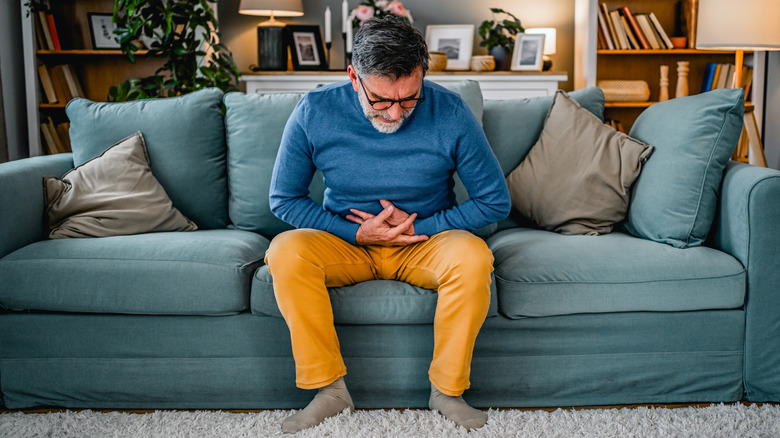Turns Out Men Can Get Prostate Stones. But Are They Painful?
You've probably heard of kidney stones. Affecting both men and women, these small, hard formations develop in the kidneys due to an excess of mineral buildup, explains the National Institute of Diabetes and Digestive and Kidney Diseases (NIDDK). Kidney stones tend to be more common in men, and can vary from the size of a speck of sand to that of a golf ball, although such cases are considered rare. But kidney stones aren't the only kind of mineral deposits that can develop in the body. Older men and people with prostates may also be susceptible to prostate stones. In some instances, kidney stones can be quite painful; is the same true for prostate stones?
Referred to as prostatic calculi, prevalence rates of prostate stones are estimated to be anywhere between 7% and 70%, according to a 2018 scientific review published in The World Journal of Men's Health. The vast majority of prostate stones are made up of calcium phosphate, and fall into one of two categories: endogenous stones or extrinsic stones. The development of endogenous stones are usually the product of chronic inflammation or an enlarged prostate, which places excess pressure on the ducts that transport secretions from the prostate to the urethra. Extrinsic stones develop due to urine reflux, or the backflow of urine towards the kidneys.
Most prostate stones are not painful
Prostate stones are generally not painful; in fact, they're usually left undetected unless identified with medical imaging technology during examination for an enlarged prostate, otherwise known as benign prostatic hyperplasia (via The World Journal of Men's Health). Despite the majority of cases being asymptomatic, some case studies have reported patient symptoms in association with prostate stones. In a 2021 report published in Cureus, a male patient in their 70s presented with frequent nighttime urination, poor urine stream, and a persistent, dull ache within the pelvis, among other symptoms.
Diagnosed with prostate stones, the patient was also found to have a history of chronic pelvic pain syndrome (CPPS). While prostate stones are generally considered rare, they have been seen more often in connection with chronic pelvic pain syndrome. While there is still much to be learned about the condition, CPPS contributes to approximately 90% of prostatitis cases, or inflammation of the prostate, according to 2016 research published in the Indian Journal of Urology. As previously mentioned, chronic prostate inflammation is one of the primary causes associated with endogenous prostate stones.
Methods of treatment for prostate stones
Depending on the severity, prostate stones do not always require treatment (via The World Journal of Men's Health). Prostate stones related to chronic prostate inflammation, however, may benefit from antibiotic treatment as well as prostatitis treatment. Antibiotics may also be used in cases of chronic prostate inflammation, specifically due to bacterial infection. However, researchers from the 2018 scientific review cite a small, early study in which antibiotics proved only 35.7% effective in treating patients who had both chronic bacterial prostatitis and prostate stones. In many cases, surgery is a more effective treatment method for more severe cases of prostate stones.
Because of the relationship between prostate stones and prostatitis, taking protective measures to reduce one's risk of prostatitis may be helpful. Although the National Institute of Diabetes and Digestive and Kidney Diseases (NIDDK) states there are currently no known preventative methods for the condition, Cleveland Clinic experts explain that using contraception during sexual intercourse can help protect against STI-related cases of prostatitis. To learn more, here are other ways men can boost their prostate health as they age.


